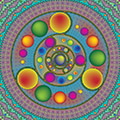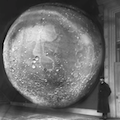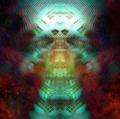
DMT-Nexus member
Posts: 2151 Joined: 23-Nov-2012 Last visit: 07-Mar-2017
|
This is a really fascinating read: apparently psilocybin works by depressing activity in the brain, and that goes a long way towards explaining things like Ego Death. There is an area of the brain that contains the ego, and when psilocybin dampens that, the ego dissolves. Full text, from Time Magazine http://healthland.time.c...ampening-brain-activity/Quote:(Updated) More than half a century ago, author Aldous Huxley titled his book on his experience with hallucinogens The Doors of Perception, borrowing a phrase from a 1790 William Blake poem (which, yes, also lent Jim Morrison’s band its moniker).
Blake wrote:
If the doors of perception were cleansed, every thing would appear to man as it is, infinite. For man has closed himself up, till he sees all things through narrow chinks of his cavern.
Based on this idea, Huxley posited that ordinary consciousness represents only a fraction of what the mind can take in. In order to keep us focused on survival, Huxley claimed, the brain must act as a “reducing valve” on the flood of potentially overwhelming sights, sounds and sensations. What remains, Huxley wrote, is a “measly trickle of the kind of consciousness” necessary to “help us to stay alive.”
A new study by British researchers supports this theory. It shows for the first time how psilocybin — the drug contained in magic mushrooms — affects the connectivity of the brain. Researchers found that the psychedelic chemical, which is known to trigger feelings of oneness with the universe and a trippy hyperconsciousness, does not work by ramping up the brain’s activity as they’d expected. Instead, it reduces it.
Under the influence of mushrooms, overall brain activity drops, particularly in certain regions that are densely connected to sensory areas of the brain. When functioning normally, these connective “hubs” appear to help constrain the way we see, hear and experience the world, grounding us in reality. They are also the key nodes of a brain network linked to self-consciousness and depression. Psilocybin cuts activity in these nodes and severs their connection to other brain areas, allowing the senses to run free.
“The results seem to imply that a lot of brain activity is actually dedicated to keeping the world very stable and ordinary and familiar and unsurprising,” says Robin Carhart-Harris, a postdoctoral student at Imperial College London and lead author of the study published in Proceedings of the National Academy of Sciences.
Indeed, Huxley and Blake had predicted what turns out to be a key finding of modern neuroscience: many of the human brain’s highest achievements involve preventing actions instead of initiating them, and sifting out useless information rather than collecting and presenting it for conscious consideration.
For the study, the authors recruited 15 brave volunteers to receive injections of psilocybin or placebo, in alternate sessions, while being scanned in an fMRI machine. Taken intravenously, psilocybin alters consciousness in a mere 60 seconds, as opposed to the 40 minutes it normally takes when administered orally. And the high lasts a half an hour, not the five hours that typical users experience.
Provisions were made for the possibility that the participants might panic while high in the noisy, claustrophic setting of the scanner, but none of the volunteers did so. In fact, once they’d become accustomed to the noise and small space, “they quite liked being enclosed and felt secure,” Carhart-Harris says. All of the participants had previously been, as Jimi Hendrix put it, “experienced.”
Researchers had assumed that the hallucinations and bizarre sensations caused by psilocybin would have at least one part of the brain working overtime. But instead they found the opposite.
“The decline in activity was the most surprising finding,” says Carhart-Harris, “and anything that’s of surprise is usually important.”
Reducing the brain’s activity interfered with its normal ability to filter out stimuli, allowing participants to see afresh what would ordinarily have been dismissed as irrelevant or as background noise. They described having wandering thoughts, dreamlike perceptions, geometric visual hallucinations and other unusual changes in their sensory experiences, like sounds triggering visual images.
Indeed, if we always paid attention to every perceptible sensation or impulse like this, we’d be incapable of focusing at all. This is why it’s difficult to sit still and try to tune in all the feelings and perceptions we normally tune out, but why also, like psychedelic drugs, meditation can make the world seem strange and new.
MORE: Magic Mushrooms Can Improve Psychological Health Long Term
The particular brain regions that were silenced or disconnected from each other by the drug also provided insight on the nature of psychedelic experience and the therapeutic potential of psilocybin. Two regions that showed the greatest decline in activity were the medial prefrontal cortex (mPFC) and the posterior cingulate cortex (PCC).
The mPFC is an area that, when dysfunctional, is linked with rumination and obsessive thinking. “Probably the most reliable finding in depression is that the mPFC is overactive,” says Carhart-Harris.
All antidepressant treatments studied so far — from Prozac, ketamine, electroconvulsive therapy and talk therapy to placebo — reduce activity in the mPFC when they are effective. Since psilocybin does the same, Carhart-Harris and his colleagues plan to study it as a treatment for depression. “It shuts off this ruminating area and allows the mind to work more freely,” he says. “That’s a strong indication of the potential of psilocybin as a treatment for depression.”
The PCC is thought to play a key role in consciousness and self-identity. “The most intriguing aspect was that the decreases in activity were in specific regions that belong to a network in the brain known as the default network,” notes Carhart-Harris. “There’s a lot of evidence that it’s associated with our sense of self — our ego or personality, who we are.”
“What’s often said about psychedelic experience is that people experience a temporary dissolution of their ego or sense of being an independent agent with a particular personality,” he says. “Something seems to happen where the sense of self dissolves, and that overlaps with ideas in Eastern philosophy and Buddhism.” This sense of being at one with the universe, losing one’s “selfish” sense and vantage point, and feeling the connectedness of all beings often brings profound peace.
The researchers also looked for an effect on the language-processing areas of the brain, since users so often report that their experience is difficult to put into words. “There wasn’t any correlation between people saying that the experience was ineffable and any change in brain activity,” Carhart-Harris says. “It may just be because the way we symbolize the world with language is a constrained function. It has a degree of precision to it, really, and these drug experiences are so unusual we don’t have words to describe them.”
Carhart-Harris and his colleagues did find support for claims made by sufferers of painful cluster headaches that psilocybin reduces the frequency of their attacks. These headaches are known to involve overactivity of a brain area called the hypothalamus, and psilocybin calmed this region.
Interestingly, Nature‘s Mo Costandi reports that another study of the effects of psilocybin on the brain found the opposite effect of Carhart-Harris’ group:
“We have completed a number of similar studies and we always saw an activation of these same areas,” says Franz Vollenweider at the University of Zurich in Switzerland. “We gave the drug orally and waited an hour, but they administered it intravenously just before the scans, so one explanation is that [their] effects were not that strong.”
Another neuroscientist told Nature that some studies find that lowered activation of the mPFC is associated with anticipatory anxiety rather than calmness or overall lack of depression. The researcher theorizes that the brain images in the current study picked up the participants’ fear, rather than their mystical experiences. But that conflicts with participants’ reports: they said their trips were mainly positive.
Carhart-Harris cautions against using psilocybin outside of a well-monitored therapeutic setting, however, particularly for patients with depression. “What we found was in healthy volunteers,” he says. “They liked the experience and didn’t have negative reactions, but during depression people are more sensitive to having a negative response to psychedelic drugs.”
In fact, that may help explain why psychedelic drugs are rarely addictive and why some of them may even have potential to treat other addictions. Unlike addictive drugs, which typically allow users to escape, psychedelic drugs have the opposite effect: instead of allowing users to avoid negative emotions, they magnify the painful feelings. Researchers believe this may help patients address their problems instead of fleeing them — in the context of an empathetic therapeutic setting — but it can also exacerbate distress. (Psilocybin is illegal in the U.S. and is considered a Schedule 1 drug, a class of substances that “have a high potential for abuse and serve no legitimate medical purpose in the United States,” according to the Department of Justice. Other Schedule 1 drugs include marijuana, heroin and LSD.)
MORE: Why Kids With High IQs Are More Likely to Take Drugs
Indeed, the new research bolsters the idea of “psychedelic” as an accurate label for these drugs. The word was originally coined by Huxley, from the Greek “psyche” for mind or soul and “delos” for manifest. A growing body of literature suggests that these drugs can indeed help scientists understand the workings of the mind and brain, by revealing some of the underpinnings of consciousness.
Some have argued, for example, that the geometric visual hallucinations commonly seen by people on psychedelics (and by some sufferers of migraines) help reveal the architecture of the brain’s visual processing mechanism. “One hypothesis is that what you’re actually seeing is the functional organization of the visual cortex itself. The visual cortex is organized in a sort of fractal way [it repeats the same patterns in different sizes]. It’s the same way that fractals are everywhere in nature. Like tree branches, the brain recapitulates [itself],” says Carhart-Harris. “You’re not seeing the cells themselves, but the way they’re organized — as if the brain is revealing itself to itself.”
It has also occured to me, since reading this article, that this idea of shutting down areas of the brain may be what causes the psychedelic Near Death Experiences, and may give some indication of what it is like to die peacefully. As the brain shuts down, psychedelic effects become more pronounced, ultimately leading to ego dissolution when the PCC starts to fail. You would probably experience ego death right before your physical death. "There are many paths up the same mountain."
|

DMT-Nexus member
Posts: 362 Joined: 30-Aug-2012 Last visit: 03-Mar-2021
|
WOW  And I like your comment, that sounds very possible and interesting. We are surprisingly similar.
|

DMT-Nexus member
 
Posts: 12340 Joined: 12-Nov-2008 Last visit: 02-Apr-2023 Location: pacific
|
"apparently psilocybin works by depressing activity in the brain" I have been aware of those studies for a long time, and it has been posted here before. I really think that assuming that that explains what happens when one takes psilocybin is sort of rediculous though. I dont even think we really know enough about it at this point to make that statement. Also from what I understood there is no proof that there is a reduction in brain activity..just that they have observed restriction of blood flow to certain areas. The rest is highly speculative. Beyond that is is obvious from that article that the results are not even consistant as another study found the opposite. At this point I think people are just speculating. Long live the unwoke.
|

lettuce
Posts: 1077 Joined: 26-Mar-2012 Last visit: 15-Jan-2016 Location: Far, Far Away
|
Certainly some interesting concepts there. One could almost say our senses are polluting our perception. This thread includes a link to a TED talk about having a stroke which touches on some very similar ideas. I just thought the concepts were in a similar vein. https://www.dmt-nexus.me...aspx?g=posts&t=41085Pup TentacleYou are precisely as big as what you love and precisely as small as what you allow to annoy you.Robert Anton WilsonMushroom Greenhouse How-ToI'm no pro but I know a a few things - always willing to help with Psilocybe cubensis cultivation questions.
|

halfsharkhalfalligatorhalfman
Posts: 20 Joined: 15-Aug-2012 Last visit: 17-Oct-2017
|
jamie wrote:Also from what I understood there is no proof that there is a reduction in brain activity..just that they have observed restriction of blood flow to certain areas. The rest is highly speculative. +1 even using the word 'ego death' requires you to not only define 'death' ( which isn't necessarily easy (tldl-people in comas otherwise 'braindead' is shown to be 'conscious'  ) but to also define the word 'ego' (something that psychologists try to use but can't epistemologically nor otherwise define) The nature of 'consciousness' is really imho one of the great remaining frontiers of science inquiry. I don't think we have the ability to yet understand what it all means... I'm not saying that we shouldn't try to understand (why else are we here?) but just that you can't just assume that you can tie what is happening in the brain state (even a theoretically perfect model of neuronal electrical potential much less the volume of blood in capillaries) always corresponds 1-1 your perception of your own consciousness. While I personally believe that there is a correlation and that studies such as these and the information gleaned from experiences as Jill Bolte Taylor describes in her TED Talk (amazing) will lead us to someday being able to simulate 'consciousness' - I'm just always watching out for leaps of faith in explanations...
|

halfsharkhalfalligatorhalfman
Posts: 20 Joined: 15-Aug-2012 Last visit: 17-Oct-2017
|
Forgot to say in my curmudgeonry that this was a cool read!
Thanks for the link!
|

DMT-Nexus member
Posts: 628 Joined: 12-Jan-2010 Last visit: 28-Feb-2019
|
I find this article very interesting. Connected to what we know about the brainwaves measured during meditation and sleep and so on this seems to fit right in. Also the discovery that psilocybin disables the brain's shield to the outside world is indeed something that has been repeated over and over by people who take it. "It permits you to see, more clearly than our perishing mortal eye can see, vistas beyond the horizons of this life, to travel backwards and forwards in time, to enter other planes of existence, even (as the Indians say) to know God." R. Gordon Wasson
|

DMT-Nexus member
 
Posts: 3968 Joined: 21-Jul-2012 Last visit: 15-Feb-2024
|
Yeah, what yall said. I think it's fairly evident that something at least very similar to this is happening. Great read,I found it quite hopeful to see the term ego death in time.  The findings on the pcc and mpfc mentioned on the article are really interesting. I do believe we are on the verge of sojme humane and effective treatments for a range of mental dysfunctions. Sine experientia nihil sufficienter sciri potest -Roger Bacon
*γνῶθι σεαυτόν*
|